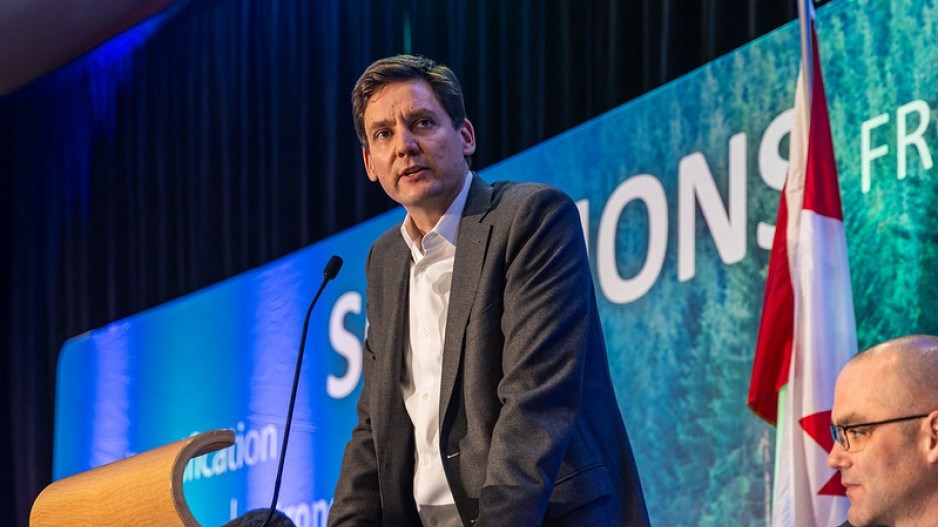Premier David Eby began his announcement of an ICBC rebate this week by blasting AC/DC’s “Back in Black” on the loudspeakers at his press conference.
“Some people say car insurance is boring, but I think it's rock and roll,” he said.
“There's no question that drivers in B.C. renewing their insurance were on the ‘Highway to Hell’ under Kevin Falcon and John Rustad. But now ICBC is ‘Back in Black’ and drivers will be ‘Thunderstruck’ by the announcement today.”
It was a creative way for a politician to begin an event. And full credit to Eby for showcasing his sense of humour. Yet there is perhaps a better song from AC/DC’s back catalogue to describe the electioneering rebate announcement: “Dirty Deeds Done Dirt Cheap.”
Making it rain cash is the oldest trick in a politician’s playbook to switch the channel from a run of bad news. So it was no surprise to see Eby announcing the $110 rebate for 3.5 million British Columbians one day after Ottawa granted his request to re-criminalize illicit drugs in public places. The message to voters was simple: Here’s some cash, pay no attention to the months of negativity our decisions on decriminalization caused.
The whole exercise, just five months before the provincial election, is transparent vote-buying. And it only cost ICBC $400 million out of its $1.5 billion surplus this year, explained Eby. Dirt cheap indeed.
“This is the fourth rebate from ICBC,” said the premier, who added that it came packaged with a rate freeze on basic insurance at ICBC for the sixth consecutive year.
“Today's announcement is timed with the BC Utilities Commission hearing that British Columbians will be hearing about directly in terms of ICBC's fiscal performance and their plan for rates going forward.”
That might be true if the BC Utilities Commission was a truly independent watchdog that held lengthy hearings to put the financial decisions of ICBC and BC Hydro to the test with expert analysis, as has been the case for the past 40 years.
But the New Democrats have taken a crowbar to the knees of the commission in the last 18 months, passing a flurry of cabinet orders that undermine the BCUC’s ability to oversee political decisions, firing the chairperson and implementing a sweeping review of its powers.
That regulatory thuggery was on display once again with the ICBC rebate, as the NDP cabinet passed three orders that effectively tied the commission’s hands, stifled any review, and ordered it to approve the rebate plan, plus the rate freeze, within 10 days of the government directive.
To sharpen the point, a government lawyer on a background briefing call took a hatchet to the remnants of the commission’s independence.
“The Supreme Court of Canada has confirmed time and time again that while these tribunals and commissions and boards possess adjudicative functions, they operate ultimately as part of the executive branch of government,” said the official.
“In other words, the unwritten constitutional guarantee of judicial independence has not been specifically held to apply to administrative tribunals.”
Translation: This NDP administration views the BCUC as just a slightly annoying arm of the government that needs to be brought to heel.
“I will happily go to British Columbians and say that we directed the utilities commission in this scenario of ICBC making $1.5 billion in a year, on ICBC's recommendation to us, to share $400 million with drivers,” said Eby.
With that kind of answer, it makes you wonder why we even have a utilities commission. And yet a big part of the reason has always been the BC NDP, which has historically fought tooth and nail for its independence in order to protect Crown corporations like ICBC and BC Hydro from being raided by politicians who wanted to craft rebate programs and artificial rate freezes to buy votes.
That was then, as they say, and this is now.
Or to put it back into the kind of AC/DC references used for laughs by the premier: The NDP is aiming to “Shoot to Thrill” its recent string of bad news, and is unwilling to put its fancy new rebate plan to an independent test for fear the BCUC could “Walk All Over You” and leave the plan “Shot Down in Flames.”
Or even more simply, five months before an election: “Moneytalks.”
Rob Shaw has spent more than 16 years covering B.C. politics, now reporting for CHEK 撸奶社区 and writing for Glacier Media. He is the co-author of the national bestselling book A Matter of Confidence, host of the weekly podcast Political Capital, and a regular guest on CBC Radio.






